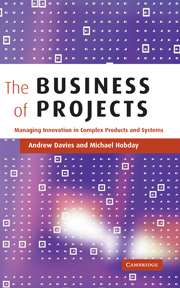Book contents
- Frontmatter
- Contents
- List of figures
- List of tables
- Foreword
- Acknowledgements
- Glossary
- 1 Introduction
- 2 The dynamics of innovation in complex products and systems
- 3 Business strategy and project capability
- 4 Systems integration and competitive advantage
- 5 The project-based organisation
- 6 Managing software-intensive projects
- 7 Learning in the project business
- 8 Integrated solutions for customers
- 9 Lessons for the project business
- Appendix A
- Appendix B
- Appendix C
- References
- Index
7 - Learning in the project business
Published online by Cambridge University Press: 22 September 2009
- Frontmatter
- Contents
- List of figures
- List of tables
- Foreword
- Acknowledgements
- Glossary
- 1 Introduction
- 2 The dynamics of innovation in complex products and systems
- 3 Business strategy and project capability
- 4 Systems integration and competitive advantage
- 5 The project-based organisation
- 6 Managing software-intensive projects
- 7 Learning in the project business
- 8 Integrated solutions for customers
- 9 Lessons for the project business
- Appendix A
- Appendix B
- Appendix C
- References
- Index
Summary
This chapter examines the learning processes that must occur for a project business to develop the capabilities to move into a new technology and market position. The long-term profitability, survival and growth of the project business depend on its ability to learn from new base-moving projects and to convert the knowledge gained into new organisational capabilities and improvements in project performance. However, research has emphasised the challenges that firms face when they attempt to capture the learning gained through projects and transfer it to their wider organisations (Middleton, 1967; Gann and Salter 1998 and 2000; DeFillippi, 2001; Grabher, 2003). There is a risk that the knowledge and experience gained are lost when the project finishes, the team dissolves and its members move on to other projects or are reabsorbed into the organisation. Unless lessons learnt are communicated to subsequent projects, there is also a risk that the same mistakes are repeated.
Despite the difficulties of project-based learning, several studies show that firms can and do achieve organisational learning through projects (Keegan and Turner, 2001; Ayas and Zeniuk, 2001; Prencipe and Tell, 2001). However, research on project-based learning has tended to focus on snapshots of learning practices within a single project or learning between projects, with few examples of ‘enduring engagement in learning and profound large-scale transformation’ as firms succeed over time in generating and diffusing the knowledge gained throughout their organisations (Ayas and Zeniuk, 2001: 61).
- Type
- Chapter
- Information
- The Business of ProjectsManaging Innovation in Complex Products and Systems, pp. 184 - 214Publisher: Cambridge University PressPrint publication year: 2005



